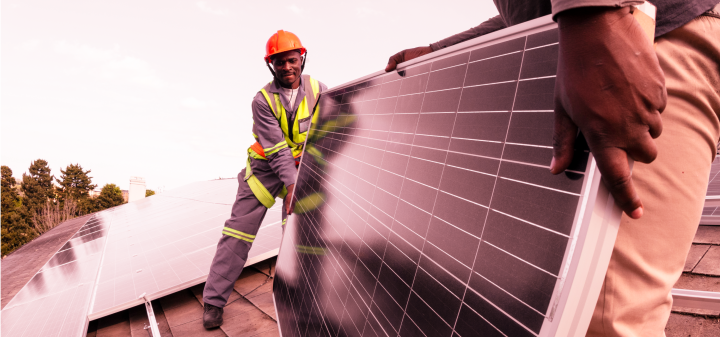SPONSORED CONTENT
#NetZero: how a bank manages its carbon footprint

Absa Group recently announced our long-term ambition is to achieve a net zero carbon state by 2050, encompassing both operational and financed Scope 1, 2, and 3 emissions. We prioritise being an active force for good by supporting a transition to a low-carbon economy, aiming to engage in business activities that have positive environmental, social, and economic impacts while mitigating any negative effects.
We have made significant progress in establishing ourselves as Africa’s leading bank in renewable energy financing. Additionally, we are actively working towards reducing our operational footprint in terms of energy and water consumption, carbon emissions, and waste management. By diversifying our use of natural resources and implementing pollution prevention measures, we are continuously mitigating our direct environmental impacts.
To effectively manage our environmental footprint, we adhere to a “measure it, to manage it” approach to environmental management. In 2022, we expanded our coverage of electricity smart-metering and building-management systems to 89% of our South African operations, along with a 51% coverage of smart-water-metering installations.
As a financial institution with a substantial real estate portfolio, our direct environmental impacts primarily stem from how we operate and manage our buildings. In this regard, we strive to occupy certified, resource-efficient green buildings. Currently, ten of our Absa corporate buildings in South Africa hold four or five-star certifications from the Green Building Council of South Africa (GBCSA). Moreover, seven buildings in Kenya have recently received certification under the IFC Excellence in Design for Greater Efficiencies (EDGE) rating scheme. We are actively expanding our portfolio of accredited buildings to include retail branches, our Zambian headquarters, and new construction projects in Ghana.
We have made substantial progress towards our goal of reducing energy consumption by 30% by 2030. Factors such as the trend towards remote working and our energy-reduction initiatives, including efficient LED lighting, HVAC optimisation, and data centre optimisation, have contributed to this achievement.
Considering the current electricity crisis in South Africa, we are actively identifying opportunities to reduce our dependence on diesel and accelerate our transition to cleaner energy sources. As a result, we are engaging in green power purchase agreements, negotiating green power tariffs with our landlords, and investing in solar photovoltaic (PV) plants for our buildings.
Two of our retail branches in Gqeberha already operate on 100% wind power supplied by the green-energy trader, PowerX. With the increasing availability of renewable energy traders, we anticipate more of our facilities utilising green power through similar arrangements. Currently, we have solar PV plants installed at five of our corporate sites and six of our retail branches, with additional installations underway in several retail sites. We are committed to being carbon neutral and increasing our renewable energy usage by 10% by 2030. Additionally, we are on track to achieve our target of reducing operational emissions by 51% by 2030.
By 2030, we aim to achieve an 80% diversion of waste generated within our facilities. To accomplish this, we are implementing waste-management practices such as reuse, recycling, upcycling, and composting. We have already piloted the replacement of single-use plastics with biodegradable materials in several of our offices and installed waste compactors and shredders across ten of our corporate sites. Our goal was to reduce office paper use by 50% by 2030, but we have already surpassed this target, achieving a 74% reduction in paper use compared to our 2018 baseline year.
We are committed to reducing our water consumption by 100 million liters by 2030, which helps alleviate pressure on water resources, improves our readiness for droughts, and indirectly reduces carbon emissions through more efficient systems. To achieve this, we have implemented various water-saving measures, including greywater re-use systems, leak detection and repair, and the use of motion sensors on water basins. Additionally, we have installed water-efficient shower heads in gyms and employed efficient technologies in our facilities, similar to those used in passenger aircraft.
This journey towards sustainability is a long-term commitment. We approach it by making intentional and meaningful progress in phases. We continue to educate and raise awareness among our employees and communities regarding the responsible use of natural resources while communicating the benefits of our initiatives. The collective progress we achieve in responsible environmental stewardship will have a profound impact on all of us.
As part of Absa’s ESG journey, we are proud to announce the extension of our sponsorship of Daily Maverick’s Our Burning Planet, the largest ESG news desk in the southern hemisphere. Additionally, we are the headline sponsor of The Gathering: Earth Edition, Daily Maverick’s first conference focusing on sustainability and the climate crisis.
Daily Maverick’s The Gathering: Earth Edition was held at the Cape Town International Convention Centre (CTICC) on 26 May 2023. Watch the live stream of the event here. DM/OBP
Author: Kobus Janse van Rensburg, Regional Head of Engineering at Absa Group

















 Become an Insider
Become an Insider